Frequently Asked Questions
Q 1. How can I become a U.S. citizen?
A You may become a U.S. citizen (1) by birth or (2) through naturalization.
Q 2. Who is born a U.S. citizen?
3
A Generally, people are born U.S. citizens if they are born in the United States or if they are born to U.S. citizens:
(1) If you were born in the United States:
Normally you were a U.S. citizen at birth.1 (Including, in most cases, the
Commonwealth of Puerto Rico, the territories of Guam and the U.S. Virgin Islands, and after November 4, 1986, the Commonwealth of the Northern Mariana Islands), (2) If you were born abroad to TWO U.S. citizens:
And at least one of your parents lived in the United States at some point in his or her life, then in most cases you are a U.S. citizen.
(3) If you were born abroad to ONE U.S. citizen:
In most cases, you are a U.S. citizen if all of the following are true:
• One of your parents was a U.S. citizen when you were born;
• Your citizen parent lived at least 5 years in the United States before you
were born; and
• At least 2 of those 5 years in the United States were after your citizen
parent’s 14th birthday.2
Your record of birth abroad, if registered with a U.S. consulate or embassy, is proof of your citizenship. You may also apply for a passport to have your citizenship recognized. If you need additional proof of your citizenship, you may file an
“Application for Certificate of Citizenship” (Form N-600) with USCIS to get a
Certificate of Citizenship. Call the USCIS Forms Line at 1-800-870-3676 to request Form N-600, or download the form at www.uscis.gov.
1 The exception is persons who were born not subject to the jurisdiction of the United States, such as children of foreign diplomats.
2 If you were born before November 14, 1986, you are a citizen if your U.S. citizen parent lived in the United States for at least 10 years and 5 of those years in the United States were after your citizen parent’s 14th birthday.
A Guide to Naturalization
5
Q 3. How do I become a naturalized citizen?
A If you are not a U.S. citizen by birth or did not acquire/derive U.S. citizenship automatically after birth, you may still be eligible to become a citizen through the naturalization process. Eligible persons use the “Application for Naturalization”
(Form N-400) to apply for naturalization.
Persons who acquired citizenship from parent(s) while under 18 years of age
use the “Application for Certificate of Citizenship” (Form N-600) to document
their citizenship. Qualified children who reside abroad use the “Application for Citizenship and Issuance of Certificate under Section 322” (Form N-600K) to
document their naturalization. You may call the USCIS Forms Line at 1-800-870-3676 to request a Form N-400, N-600, or N-600K; or you may download all of these forms at www.uscis.gov.
Q 4. What are the requirements for naturalization?
A Please see Section 4, “Who Is Eligible For Naturalization?,” beginning on page 17
for more details on the eligibility requirements for naturalization. You should also complete the Eligibility Worksheet in the back of this Guide to help you find out if you meet the eligibility requirements.
6
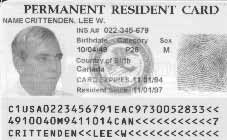
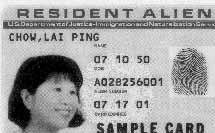
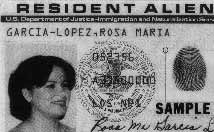
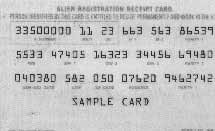
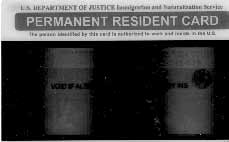
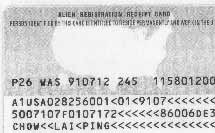
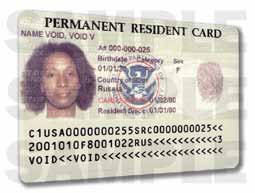
Q 5. When does my time as a Permanent Resident begin?
A Your time as a Permanent Resident begins on the date you were granted permanent resident status. This date is on your Permanent Resident Card (formerly known as an Alien Registration Card or “Green Card”). The sample cards on this page show where you can find important information such as the date your Permanent Residence began.
Front










